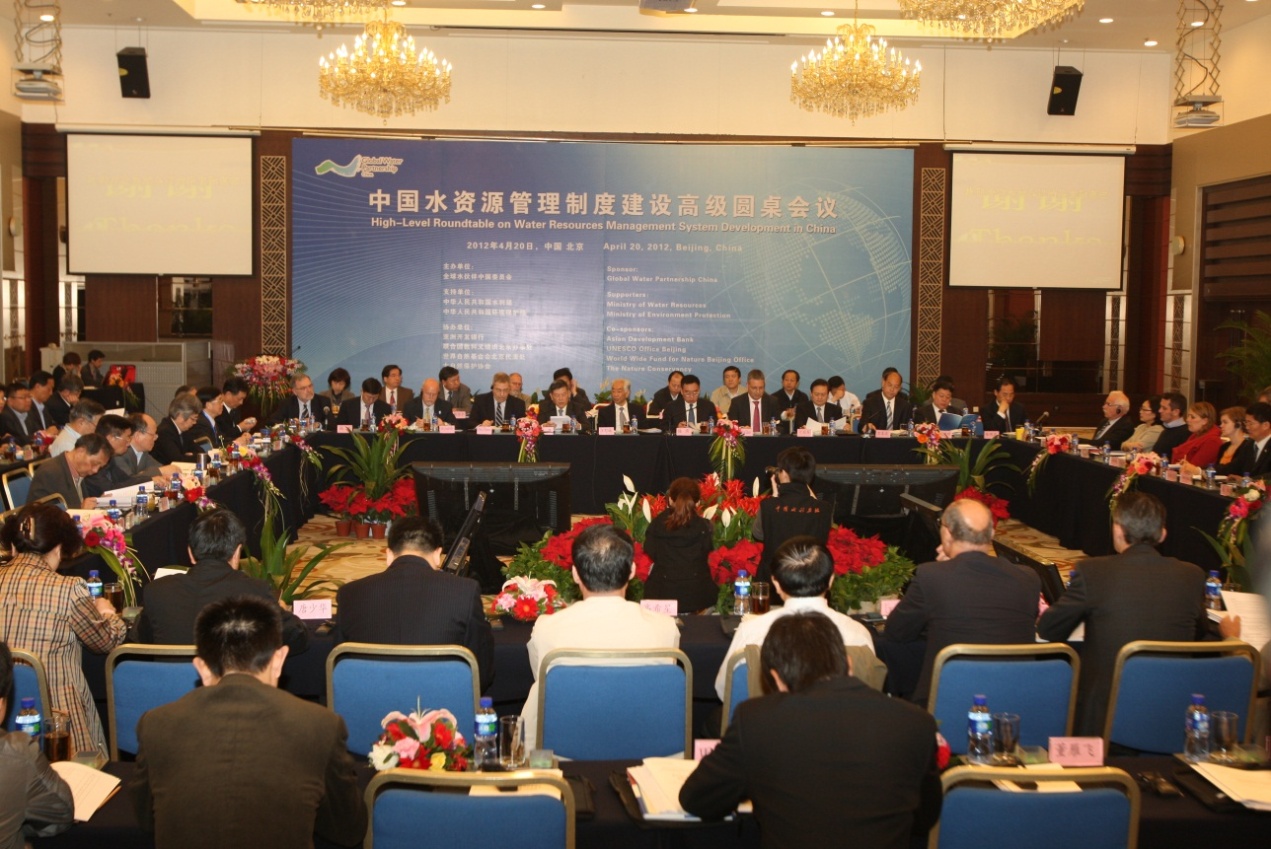With the support of the Ministry of Water Resources and the Ministry of the Environmental Protection, the High-Level Roundtable on Water Resources Management System Development in China was organized by Global Water Partnership China on April 20, 2012 in Beijing with the co-sponsors of Asian Development Bank, World Wild Fund (WWF) China, the UNESCO Office Beijing and The Nature Conservancy (TNC). The meeting aimed at establishing water management mechanism with well-defined duties, rights and responsibilities, standard actions and collaborative operations and the cooperation and coordination mechanisms for the harmonious development of river basins and regions as well as facilitating the strictest water management system and better water resources management system of river basins through the integrated water resources management approach.
Chaired by Mr. Wang Shucheng, the Vice Chair of Financial & Economic Committee of the 11th NPC and Chair of GWP China, the Roundtable was started with the addresses of Mr. Chen Lei, the Minister of Water Resources; Mr. Du Ying, Vice Minister of the National Development and Reform Commission; Mr. Wan Bentai, Chief Engineer of the Ministry of Environmental Protection and Mr. Yu Youjun, Vice Minister of the Office of The South-To-North Water Diversion Project Construction Committee of the State Council. Slots were also given to Dr. Markus Ederer, Ambassador of EU Delegation to China; Mr. Paul J. Heytens, Country Director of Asian Development Bank PRC Resident Mission; Mr. Jim Gradoville, CEO of WWF-China and Mr. John Metzger, Head of Network Officers of GWPO. The presentations were given by Mr. Chen Mingzhong, Director General of the Department of Water Resources Management, Ministry of Water Resources and Mr. Zhao Hualin, Director General of the Department of Total Pollutants Control, Ministry of Environment Protection and other five invited specialists after the their two keynote speeches.
The meeting invited 140 participants from the key water-related ministries under the State Council, and relevant departments of the Ministry of Water Resources, UN organizations’ offices in China, foreign embassies in Beijing, universities, research institutes and NGOs.
This Roundtable meeting was resulted with the deep discussions and exchange of ideas and experiences around the theme and the following common understanding and consensus were reached:
1) China is facing a severe challenge of water scarcity and heavy water pollution. The No.1 Policy Document on Reform and Development in Water Sector and related laws were issued by the Chinese Central Government last year that pointed out the countermeasures according to these challenges. The system will be supported by “three red-line”. In other words, the sub-systems on flood control, drought prevention and disaster reduction, rational allocation and efficient use of water resources, water resources protection and river-lake health security and water scientific development would play key roles in development and protection of resources, water saving and protection of water resources and water environment;
2) The implementation of No.1 Policy Document and relevant laws has to face huge challenges which would be necessary to promote further reform of mechanisms and system as well as formulate coordinated laws and rules. It must set up action details of “three red-line”; raise relevant technical standards, pricing indicators and technical systems and improve enforcement system and pertinent rules and mechanisms of reward and penalties;
3) The implementation of the strictest water resources management system involves different sectors, including water, environmental protection and others. The key message of the No.1 Policy Document is to discuss about how to establish coordination mechanisms and the methods of promoting widespread participation of the public, private and NGOs;
4) The core technical supports to the “three red-line” are information monitoring system of water resources, environment and ecosystem and the evaluation system of lake and river health;
5) The other key tools of implementing the strictest water resources management system also include developing the international cooperation and sharing advanced concepts, models and technologies relating water management from other countries. The EU-China Water Platform formed in March in Marseille is deemed as an admirable beginning and example.
The proceedings, videos and other materials that present the outcomes of the Roundtable are distributed to the relevant governmental sectors as the political reference.
